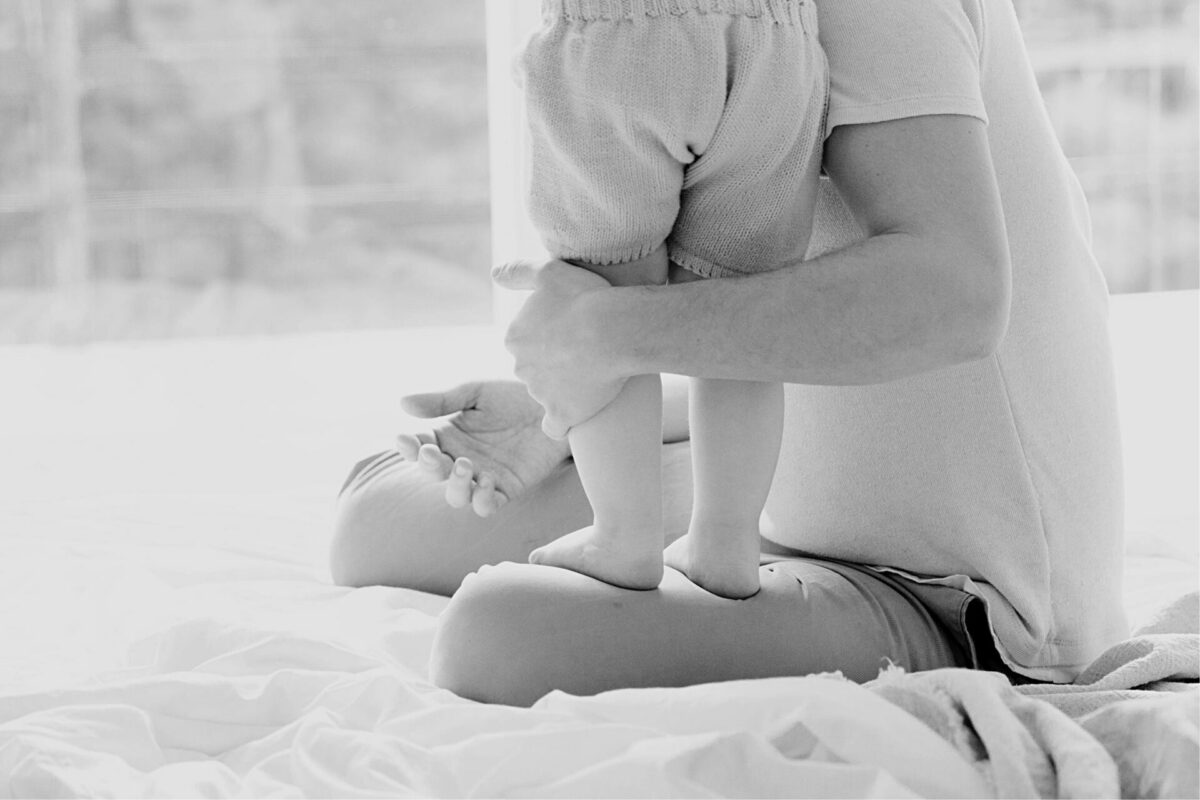My Mom has always evaluated public figures by their marriage status. Her review of Bob Odenkirk’s memoir: “Not a particularly likable guy, but at least he got married.” Growing up in her house, I believed that marriage and family were the key to a good life the way I believed in gravity. So, I got married at twenty-two and started a family at twenty-five. I figured, let’s get to the good stuff. However, when my wife got pregnant last year, I began to doubt Mom’s wisdom.
When you tell someone you’re getting married, they say, “Congratulations! You found the one!” When you tell someone you’re expecting, the reflexive “Congratulations!” is often followed with a warning. I was told, “Sleep now, you won’t when the baby comes. . . . Relax now, you never will again. . . . Enjoy your spouse now, things will never be the same,” and my personal favorite, “Whatever you do, don’t have a daughter.”
All this “advice” made my daughter’s due date feel less like a new chapter and more like a terminal diagnosis: a future point beyond which our outlook was bleak. Our initial joy was leavened with dread, and I leaned on Mom’s unflagging enthusiasm over the tumultuous months.
Her deeply Christian approach to marriage and family as paths to holiness and sainthood, a view I agreed with in principle, was hard to cling to in the face of cultural messaging that life is about pleasure and comfort, which marriage might provide but a child is sure to disrupt. By then, however, I was a bit skeptical of the popular despair around parenthood because marriage was not quite the “Happily Ever After” I’d been sold.
On the one hand, my newlywed days were some of the happiest of my life. Waking up next to the woman who had become my best friend, having a partner for errands and movies, and sharing the minutiae of life with another person was all wonderful. A lifetime of movies and wedding toasts had primed me to believe that I deserved happiness and that marrying “the one” would ensure it.
However, I found that marital bliss was actually more achievement than natural law after I was taken to task for my curtain closing, nose blowing, and hard hearing. Better Call Saul languished while 90 Day Fiancé became a nighttime fixture, and my pleasant one dog walks became embarrassing three dog fiascos.
In short, the very person who was instrumental in achieving my well-deserved happiness was also capable of causing my distinct unhappiness. Our first genuine disagreements shook me up. What was all that “you deserve happiness” talk about? I felt I had failed as a spouse because I thought disagreement and disharmony were aberrations, mistakes, for old people, for people who had chosen wrong—not for us, the rightful heirs of happiness!
Contrast this with the birth of my daughter, where I was mentally prepared to be a divorced zombie by the time maternity leave was over. The fear of God was in me. Sure enough, my sleep started getting interrupted, I developed a constant baby radar, and I was a bit cranky. But: I was in awe of my wife’s heroic labor and delivery, and my baby was the cutest in the world, so life seemed pretty good.
This may seem a roundabout way of saying “underpromise, overdeliver.” Marital expectations are set sky high, parental expectations are set at rock bottom. With that setup, your spouse can’t help but disappoint, and your child can’t help but delight. But the reason those transitions are framed differently hints at the limits of the “life is about happiness” mindset.
In our world of Netflix, TikTok, and OnlyFans, we have easy access to our increasingly particular pleasures. Gluttony, once a problem reserved for kings, now is commonplace. Instead, we fast—from screens or sugar—hoping to refresh our overstimulated pleasure glands. The most dominant online genres, as Ross Douthat notes in The Decadent Society, are political polemics and pornography, which for all their apparent differences, result in the same constant clicking pleasure seeking.
Naturally, marriage and family are evaluated in terms of happiness. Marriage—with massive popular support around finding love—can still parade as a means to self-fulfillment and fun. Childrearing, however, is so unavoidably limiting, self-sacrificial, and demanding, that the Church is one of the only places that still calls children a “blessing.” Indeed, it is the Church and my uber pro-life mother who provided the language and momentum for choosing meaning and satisfaction over short-term pleasures.
I have never solved a disagreement with my spouse falling back on, “I deserve happiness.” However, I have taken solace in our wedding vows and the teaching that marriage is chiefly a path to holiness, not happiness. All the pre-natal advice that amounted to, “Kill yourself now because your life is over when the baby comes,” surprisingly, was not helpful. It was Mom always calling life a “gift” and my Church’s reverence for Mary, the mother of God, that buoyed me.
I was blessed with a mother and Christian upbringing that I could fall back on. Many young people lack a framework that values cultivating virtue, bearing responsibility, and pursuing holiness. Instead, they are told “You do you” and “You deserve happiness,” but this self-oriented life doesn’t fill the God-shaped hole, the hunger for transcendence and intimacy. As David Foster Wallace said, “Everyone worships,” and the idols of my generation—celebrity, social justice, wealth—are failing miserably to provide meaning and purpose.
Perhaps the word of Jesus most suited for my generation is: “Whoever wants to save his life will lose it, but whoever loses his life for My sake will find it.” I did not think much of that verse growing up, but especially after having a kid, the Church has offered a bulwark against the onslaught of skepticism and doomsaying that parenthood brings.
Unlike marriage, where the unsolicited advice stops after your wedding day, with kids, it just keeps coming. The “Enjoy yourself now” lot immediately switch to “Just you wait.” After nine months of worrying about the delivery, it turns out there’s a whole new set of fears.
My wife was in line at the post office the other day, and as my four-month-old sucked her fingers, a woman approached, “Oh just wait ‘til the braces come. Thousands of dollars.” Just you wait, they say, ‘til she’s teething, or crawling, or sick, or walking, or dating, or you have your second child.
Some say the big adjustment is zero to one child, some one to two (double trouble), others two to three (from man-to-man to zone defense). And if your first baby is great, it’s a “trick baby”: deceptively good and non-representative. Just wait ‘til you get the real thing. This sort of thinking will drive you crazy because there is no finish line. Your whole life will be spent agonizing over the next potential pitfall.
There’s a second category of advice I’ve gotten since the baby came, however, often from empty nesters of Mom’s generation. Rather than the dangerous future, these people point to the precious present. Instead of “Just you wait,” they say, “Just don’t blink.” With bizarre consistency, they add, “It goes like that” and snap their fingers.
Perhaps it’s a case of romanticizing the past. The younger parents in the thick of it are usually the grim ones. Still, I’m struck by the fondness of these older parents as they think back on raising kids. I know now it’s not because they were having fun 24/7, but they had the deeper joy of commitment, challenge, and sacrifice.
It is so easy—and young people do this calculation often—to see all that you will give up if you get married and start a family. It is much harder to quantify what you get in return. There is no shortcut or hack to getting the smile of trust and comfort my daughter saves for me, her midnight caregiver, or the marital peace borne not of ignorance but persistent pursuit of intimacy.
My daughter has made me so grateful—and not in a “Thank you for this hot coffee” kind of way but in a “Hot shower and indoor plumbing after wet night on the trail” kind of way. Grateful for things that used to be invisible and taken for granted.
I never thought to be grateful for getting on an airplane with no chance of upsetting all the passengers on the flight until I boarded a plane with my 2-month-old and realized that was now possible. I didn’t use to think much of driving to the grocery store, but now that I drive around with a 4-month-old ticking bomb, driving alone is luxurious. Now, that my sleep can be interrupted every night, a good night’s rest makes me grateful from the moment I wake up.
Calling marriage a vehicle for sanctification or dropping Mom’s line, “Parenthood is the quickest path to sainthood,” may not sound slick, but marriage and parenthood have helped make life’s struggles feel meaningful rather than like transgressions against my right to happiness. I want to carry on Mom’s legacy of praising and pursuing the family life as a counter to the popular but misguided advice to avoid responsibility and chase happiness.
A life aimed at happiness is restless, always seeking the next high. A life aimed at meaning, the life parenthood thrusts on you, is wonder-full. It is saying no to the vague anxieties of the future and saying yes to the concrete joys of the present: a daughter’s smile, a wife’s forgiveness, the miracle of new life. Suffering will come, but I will not be waiting for it in dread. I’ll be too busy laughing with my daughter for that.







5 comments
Anthony
Thank you for this post. I’d be lying if I said I haven’t been struggling with feeling like a “good enough” dad and husband since my son was born this past October.
Martin
How did the fourth dog come into the picture?
Martin
Your daughter wanted one?
Brian
Thank you for writing, and congratulations! And don’t stress too much, they’ll be fine, “this too shall pass” is the cliche I suggest to keep in mind, stress and worry just keeps you from enjoying the good times, the memories of the bad times will fade away over time, that’s how humans keep going… (Father of 18, 14, and 10 year old girls here).
Robbie Sapunarich
Thanks for this Ben — as a new dad in the thick of it with a ten month old, this really hit me.
Comments are closed.